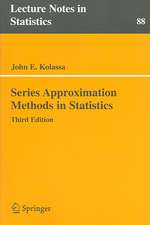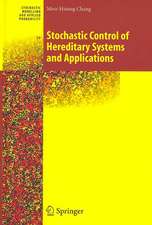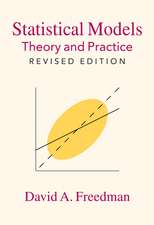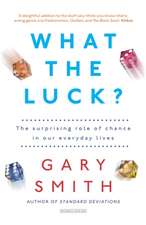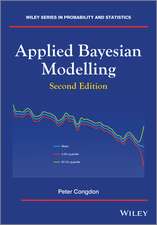Introduction to Statistical Methods, Design of Experiments and Statistical Quality Control
Autor Dharmaraja Selvamuthu, Dipayan Dasen Limba Engleză Paperback – 16 dec 2018
Organised into 10 chapters, the book discusses three different courses namely statistics, the design of experiments and quality control. Chapter 1 is the introductory chapter which describes the importance of statistical methods, the design of experiments and statistical quality control. Chapters 2–6 deal with statistical methods including basic concepts of probability theory, descriptive statistics, statistical inference, statistical test of hypothesis and analysis of correlation and regression. Chapters 7–9 deal with the design of experiments including factorial designs and response surface methodology, and Chap. 10 deals with statistical quality control.
| Toate formatele și edițiile | Preț | Express |
|---|---|---|
| Paperback (1) | 408.50 lei 38-45 zile | |
| Springer Nature Singapore – 16 dec 2018 | 408.50 lei 38-45 zile | |
| Hardback (1) | 580.10 lei 38-45 zile | |
| Springer Nature Singapore – 14 sep 2018 | 580.10 lei 38-45 zile |
Preț: 408.50 lei
Preț vechi: 504.33 lei
-19% Nou
Puncte Express: 613
Preț estimativ în valută:
78.18€ • 81.31$ • 65.42£
78.18€ • 81.31$ • 65.42£
Carte tipărită la comandă
Livrare economică 10-17 martie
Preluare comenzi: 021 569.72.76
Specificații
ISBN-13: 9789811346736
ISBN-10: 9811346739
Pagini: 430
Ilustrații: XXI, 430 p. 90 illus., 39 illus. in color.
Dimensiuni: 155 x 235 x 33 mm
Ediția:2018
Editura: Springer Nature Singapore
Colecția Springer
Locul publicării:Singapore, Singapore
ISBN-10: 9811346739
Pagini: 430
Ilustrații: XXI, 430 p. 90 illus., 39 illus. in color.
Dimensiuni: 155 x 235 x 33 mm
Ediția:2018
Editura: Springer Nature Singapore
Colecția Springer
Locul publicării:Singapore, Singapore
Cuprins
Chapter 1. Introduction.- Chapter 2. Review of Probability.- Chapter 3. Descriptive Statistics.- Chapter 4. Sampling Distributions and Estimation.- Chapter 5. Testing of Hypothesis.- Chapter 6. Analysis of Correlation and Regression.- Chapter 7. Single Factor Experimental Design.- Chapter 8. Multi-Factor Experimental Designs.- Chapter 9. Response Surface Methodology.- Chapter 10. Statistical Quality Control.
Notă biografică
DHARMARAJA SELVAMUTHU is Professor at the Department of Mathematics, Indian Institute of Technology Delhi, India. He also served as Head of the Department of Mathematics, Indian Institute of Technology Delhi. He earned his M.Sc. degree in Applied Mathematics at Anna University, Chennai, India, in 1994 and PhD degree in Mathematics from the Indian Institute of Technology Madras, India, in 1999. He has held visiting positions at Duke University, U.S.A.; Emory University, U.S.A.; University of Calgary, Canada; University of Los Andes, Bogota, Colombia; National University of Colombia, Bogota, Colombia; University of Verona, Italy; Sungkyunkwan University, Suwon, Korea; and Universita Degli Studi di Salerno, Fisciano, Italy. His research interests include applied probability, queueing theory, stochastic modeling, performance analysis of computer and communication systems and financial mathematics. He has published over 45 research papers in several international journals of reputeand over 20 research papers at various international conferences.
DIPAYAN DAS is Associate Professor at the Department of Textile Technology, Indian Institute of Technology Delhi, India. He obtained PhD degree from the Technical University of Liberec, the Czech Republic, in 2005. His research interests are in the areas of modeling of fibrous structures and their properties, product and process engineering using statistical and mathematical techniques, and nonwoven products and processes. He has published four books including two monographs and over 100 research papers in scientific journals and conference proceedings. He is a recipient of the BIRAC-SRISTI Gandhian Young Technological Innovation (GYTI) Appreciation Award (in 2018), IIT Delhi Teaching Excellence Award (in 2017), and Kusuma Trust Outstanding Young Faculty Fellowship (from 2008 to 2013).
DIPAYAN DAS is Associate Professor at the Department of Textile Technology, Indian Institute of Technology Delhi, India. He obtained PhD degree from the Technical University of Liberec, the Czech Republic, in 2005. His research interests are in the areas of modeling of fibrous structures and their properties, product and process engineering using statistical and mathematical techniques, and nonwoven products and processes. He has published four books including two monographs and over 100 research papers in scientific journals and conference proceedings. He is a recipient of the BIRAC-SRISTI Gandhian Young Technological Innovation (GYTI) Appreciation Award (in 2018), IIT Delhi Teaching Excellence Award (in 2017), and Kusuma Trust Outstanding Young Faculty Fellowship (from 2008 to 2013).
Textul de pe ultima copertă
This book provides an accessible presentation of concepts from probability theory, statistical methods, the design of experiments and statistical quality control. It is shaped by the experience of the two teachers teaching statistical methods and concepts to engineering students, over a decade. Practical examples and end-of-chapter exercises are the highlights of the text as they are purposely selected from different fields. Statistical principles discussed in the book have great relevance in several disciplines like economics, commerce, engineering, medicine, health-care, agriculture, biochemistry, and textiles to mention a few. A large number of students with varied disciplinary backgrounds need a course in basics of statistics, the design of experiments and statistical quality control at an introductory level to pursue their discipline of interest. No previous knowledge of probability or statistics is assumed, but an understanding of calculus is a prerequisite. The whole book serves as a master level introductory course in all the three topics, as required in textile engineering or industrial engineering.
Organised into 10 chapters, the book discusses three different courses namely statistics, the design of experiments and quality control. Chapter 1 is the introductory chapter which describes the importance of statistical methods, the design of experiments and statistical quality control. Chapters 2–6 deal with statistical methods including basic concepts of probability theory, descriptive statistics, statistical inference, statistical test of hypothesis and analysis of correlation and regression. Chapters 7–9 deal with the design of experiments including factorial designs and response surface methodology, and Chap. 10 deals with statistical quality control.
Organised into 10 chapters, the book discusses three different courses namely statistics, the design of experiments and quality control. Chapter 1 is the introductory chapter which describes the importance of statistical methods, the design of experiments and statistical quality control. Chapters 2–6 deal with statistical methods including basic concepts of probability theory, descriptive statistics, statistical inference, statistical test of hypothesis and analysis of correlation and regression. Chapters 7–9 deal with the design of experiments including factorial designs and response surface methodology, and Chap. 10 deals with statistical quality control.
Caracteristici
Covers the statistical methods, the design of experiments and statistical quality control Supplies several practical examples and end-of-chapter exercises tested by students in classes Provides an easy access to the subject matter without sacrificing rigour at the same time keeping prerequisites to a minimum Is useful to three different courses: statistics, the design of experiments and quality control




